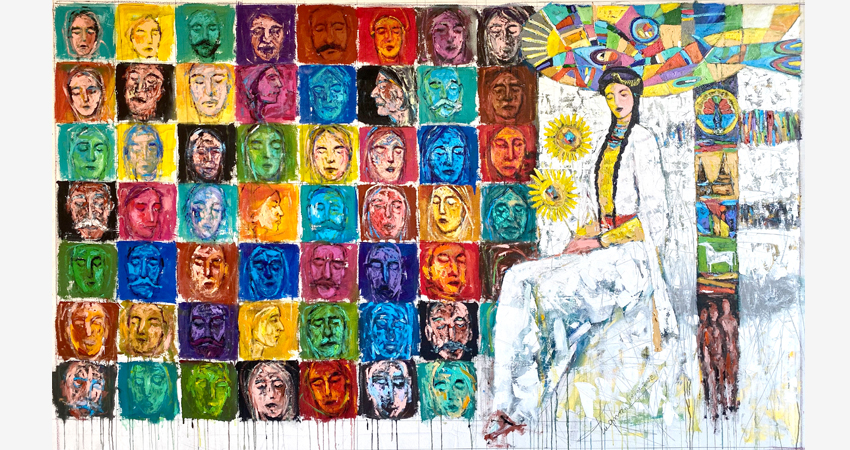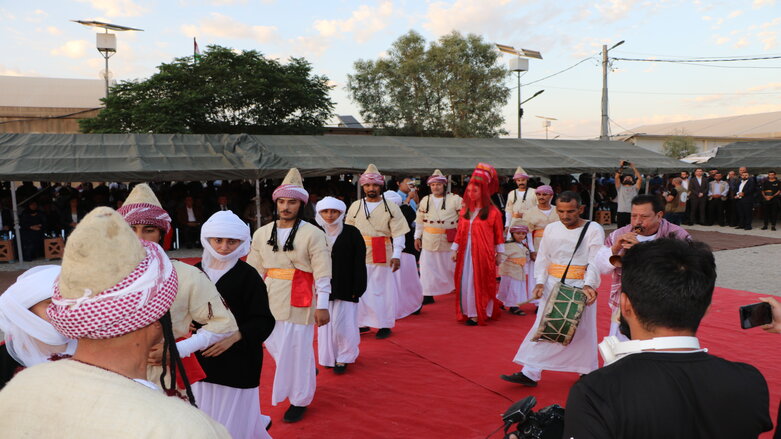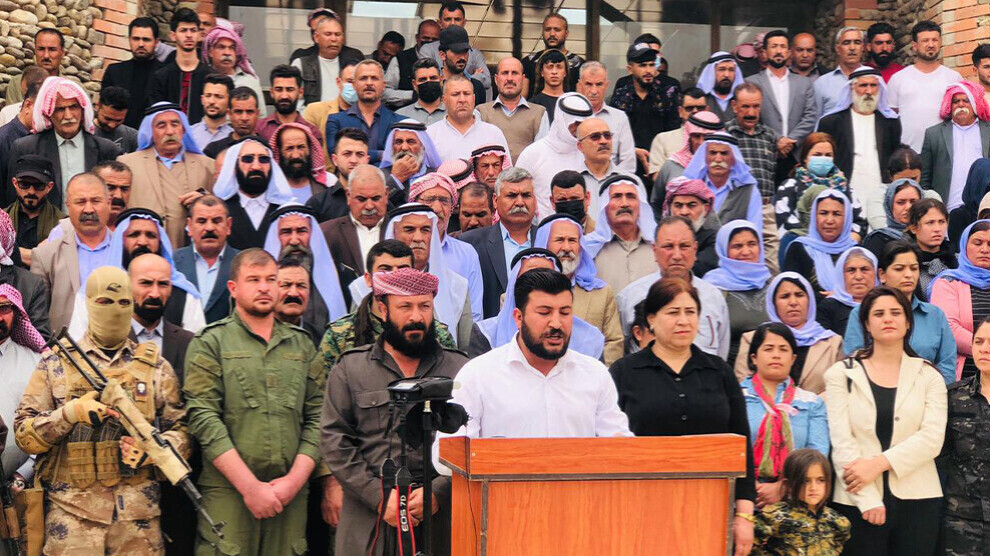 Yazidis in SyriaDecades of Denial of Existence and DiscriminationExecutive Summary
Yazidis in SyriaDecades of Denial of Existence and DiscriminationExecutive SummaryThe presence of Yazidi (Ezidi) communities in Syria and the region dates back to ancient times.[1] As a result of multiple genocides, their once-large communities have diminished and they are now a religious minority at the risk of annihilation. The surviving communities continue to live in small enclaves in countries like Syria, Iraq, Kurdistan, and Turkey..
In 2014, Yazidis suffered the latest genocide at the hands of the Islamic State (IS)—also known as the Islamic State of Iraq and the Levant (ISIL), and by the Arabic acronym Daesh in local media. ISIS attacked the region of Sinjar (Şingal), in Iraq, then detained and transported thousands of male and female Yazidis to Syria, where they were subjected to “almost unimaginable horrors”, according to the Independent International Commission of Inquiry on the Syrian Arab Republic (hereinafter Commission of Inquiry on Syria).[2]
Most of the extermination campaigns perpetrated against Yazidis were preceded by smear campaigns, which targeted the community’s beliefs, faith, customs, and origins and aimed to spread disinformation about the religion and its rituals, as well as dehumanize its practitioners. These smear campaigns contributed to the creation a hostile environment that would ultimately condone killing and displacement of Yazidis.
In addition to targeted smear campaigns, other factors have damaged the reputation of minority religions in Syria and differentiated them from the State’s “official religion”. Such factors include the lack of mutual understanding among existing religions, poor religious tolerance, and the refusal of both Syrian religious and government institutions to acknowledge the right of smaller religious communities to freely practice their rituals and traditions.
Though most of the Yazidis are Kurdish in ethnicity and speak the Kurdish language (Kurmanji), religiously they are distinct from the majority Sunni Kurdish population. As minorities, some Yazidis prefer to be recognized as an ethnic group, distinctly separate from the Kurds because of their cultural and religious differences.[3]
The central temple of Yazidis— the Lalish Temple— is located in Shikhan area, near the city of Mosul, in Nineveh province, Iraq. However, Yazidi populations are spread across Iraqi Kurdistan and parts of Syria, Lebanon, Turkey, and Iran. Additionally, large numbers are based in Armenia and Georgia.
ISIS horrors were not the last perpetrated against Yazidis, who continue to suffer from atrocities committed by other military groups, including armed opposition groups affiliated with the Syrian Opposition Coalition (SOC). The opposition factions committed a wide array of violations against Yazidis during and after the Turkish-led Operations “Olive Branch” in 2018 and “Peace Spring” in 2019. For example, some factions arbitrarily detained Yazidi women in the Afrin region and coerced them to “convert into Islam”.[4]
Furthermore, in Afrin today, Yazidis are banned from celebrating religious events and providing religious education
These violations have been subject to international scrutiny. In its 2020 report on Syria, the U.S. Commission on International Religious Freedom criticized the reported “persecution and marginalization” against “[r]eligious and ethnic minorities, especially displaced Kurds, Yezidis, and Christians, in areas under Turkish control, such as in the city of Afrin”.
Additionally, the Commission recommended that the U.S. government “[e]xert significant pressure on Turkey to provide a timeline for its withdrawal from Syria, while ensuring that neither its military nor FSA allies expand their area of control in northeast Syria, carry out religious and ethnic cleansing of that Area”.[5]
MethodologyThis report lists genocides committed against Yazidi communities and addresses the smear campaigns that paved the way for those genocides. Smear campaigns have spread misinformation about Yazidi beliefs, customs, and origins, mischaracterizing the community and making them vulnerable to violence.
In response to defamation, the report will delve into the origins of Yazidism, its beliefs, rituals and the symbols hinging it as a religion. Additionally, the report will review the violations perpetrated against Yazidis in Syria in particular, also listing several Islamic fatwas (edicts) issued against Yazidism, and the Islamic narratives projected onto it.
Furthermore, the report will address the presence of the Yazidi community in contemporary Syria, and how successive Syrian governments dealt with this religious minority, also tackling the practices Yazidis are exposed to in the areas controlled by Turkey-backed armed groups in and around Afrin region, and Ras al-Ayn/Serê Kaniyê area.
Turkey’s two offensives into Syria in 2018 and 2019, known respectively as Operation Olive Branch and Operation Peace Spring. The operations led to the displacement of the overwhelming percentage of the Yazidi population in Ras al-Ayn/Serê Kaniyê area, and most of the population that inhabited Afrin.
To this end, the report primarily builds on 32 interviews, carried out with Yazidi victims who are in Syria and/or have immigrated aboard. Among the interviewees are 14 women.
In addition to victim accounts, the report draws on reports and studies issued by local and international human rights organizations.
When approaching the Yazidi issue legally, the report cites the Syrian constitution, notably texts related to religious freedoms, and Syrian Personal Status Law, which provides citizens with regulatory frames.
Historically, the report reviews several studies and research papers on Yazidism in Syria and the region, tackling its origins and doctrine, as well as the violations perpetrated against its followers.
The report is divided into three sections. In Section I, the report addresses conflict-related violations committed against Yazidis in Syria since 2011 up to 2022, with a focus on violations perpetrated in the areas controlled by the Turkish military, in the regions of Afrin and Ras al-Ayn/Serê Kaniyê.
Additionally, the report backs the documentation with the testimonies of victims, who suffered property appropriation, arrest, or even death because they embrace a religion which differs from that of the ruling factions in their areas.
In Section II, the report addresses the violations Yazidis suffered under the Syrian government (SG) with a focus on pre-2011 abuses, including deprivation of legal rights and lack of recognition as an independent religious group. In this context, the report reviews the SG’s legal and constitutional frames, in addition to the Personal Status Law, and the violations of the rights of Yazidis as a religious community. Additionally, the report presents international laws and legislations that protect the rights of religious minorities, in keeping with universal human rights principles.
In Section III, the report probes into the roots of Yazidism, exploring its origins, beliefs, and rites. Furthermore, the report examines the violations committed against Yazidis over the course of their history and their locations in Syria and set of recommendations to the stockholders.
Introduction
Yazidis are defined as a traditional non-missionary and tightly-knit religious community. They cling to their ancient social and religious rituals, governed by specific laws that were established thousands of years ago. Both as a human group and a religious community, they are seen to reflect the beliefs and practices of ancient Indo-Aryan societies.
The central temple of Yazidis— the Lalish Temple— is located in the Shikhan area, near the city of Mosul, in Nineveh province, Iraq. However, Yazidi populations spread across Iraqi Kurdistan and parts of Syria, Lebanon, Turkey, and Iran. Additionally, large numbers are based in Armenia and Georgia.[6]
Several ethnic cleansing campaigns and massacres have been perpetrated against Yazidis, with smear campaigns mischaracterizing the community and its faith system. These campaigns have frequently attempted to alienate Yazidis from their own religion, at times categorizing them as Christians or Muslims, and labeling them “murtadeen” (apostates).
Attempts of forced religious categorization were met with resistance and rejection, and in some cases, refusal meant death. Many Yazidis, existentially threatened, were left with only three choices to survive: changing religion, converting to the religion of the area’s ruler or dominant group, or leaving their homes and escaping elsewhere.
In Syria, Yazidis have been historically subjected to oppression and persecution. They have been deprived of practicing their own religious rites, learning and teaching the origins of their religion, building new places of worship or restoring old ones like other religions and communities in Syria, and even of performing their religious ceremonies. On top of this, they were forced to attend al-Tarbiyah al-Islamiyah (Islamic education) classes in schools.
After 2011, Yazidis had a historical opportunity to bring to light their religious character in the areas under the control of the Autonomous Administration—led mainly by Kurds and officially established in 2014. However, this opportunity was brief. The areas where many Yazidis lived, such as Afrin and Ras al-Ayn/Serê Kaniyê, suffered two Turkish military incursions—Olive Branch in 2018, and Peace Spring in 2019.
In the aftermath of the two offensives, the targeted areas suffered systematic violations of human rights. The violations were perpetrated especially against Kurds and, naturally, did not spare Yazidis.[7]
In addition to targeted smear campaigns, other factors have damaged the reputation of minority religions in Syria and differentiated them from the State’s “official religion”. Such factors include the lack of mutual understanding among existing religions, poor religious tolerance, and the refusal of both Syrian religious and government institutions to acknowledge the right of smaller religious communities to freely practice their rituals and traditions.
Legal and scholarly material on Yazidi history and practices highlight recurring political and religious forces which have attempted to publicly mischaracterize Yazidism, demean its followers, and entice them to convert to the area’s dominant religion.
Even in scholarly texts, the Yazidi faith and faith community have been mislabeled and demeaned, with some researchers labeling Yazidism as a modern “situational religion” or a sect that has strayed “from under the cloak of revealed religions”, and even branded its rituals as “Sufi heresies”.
Other researchers established a link between Yazidism and ancient Iranian religions, such as Zoroastrianism and Manichaeism, and also with Ancient Mesopotamian beliefs such as Sumerian, Babylonian and Mandaean. A different set of researchers viewed Yazidism as a depiction of the diverse Ancient religious beliefs of the peoples of Central Asia.
Except for a few, the majority of Yazidism-focused studies have neglected investigating the origins of the religion and the environment from which it emerged. As a result, misinformation about Yazidi social classes and religious structures is widespread.
These studies, founded upon pre-existing religious, national, and intellectual assumptions, relied on the sources of those hypotheses as if they were established ideas. Consequently, differing opinions emerged about the origin of this religion, its basic principles and rituals, and even its name.
However, the 2014 IS-led genocide against Yazidis in Sinjar (Şingal) prompted many recent studies that adopted new perspectives in their approach to the nature of this religious community and the realities surrounding it.
RecommendationsYazidis consider Yazidism an independent religion, not an offshoot of any of the other religions in Syria or the Middle East, such as Islam, Christianity, and Judaism. Yazidism has its own unique system of beliefs, teachings, and rituals. Therefore, Yazidism must be equalized with other religions in terms of treatment and not be subjected to existential and doctrinal marginalization by being forced under the mantel of other religions.
Historically, Yazidis have been marginalized by successive Syrian governments. These practices clearly contradict the duties that the Syrian State has committed to under various Syrian constitutions, including the operative 2012 constitution, which stipulates equality among Syrians without discrimination on any basis, including religion, while also ensuring the freedom of belief.
In addition to exclusionary patterns, large-scale violations have been perpetrated against Yazidis in Syrian territories occupied by Turkey and the armed Syrian position groups it backs.
Notably, the marginalization of Yazidis and the multiple attempts at denying their existence has generated tension and animosity among the different components of a country’s population, which has had chronic and catastrophic impacts on Yazidi communities. In Syria, Yazidis lack of official recognition as an independent religion has marginalized their communities and robbed them of a variety of rights, especially those related to establishing their personal status, such as the registration of marriages and births.
Taking this history into account in an attempt to avoid the adverse impacts of religious mismanagement in Syria by successive governments and protect Yazidi communities from religious-related violations, this report’s writers recommend the following:
The United Nations should reconsider the structure of the current Syrian Constitutional Committee and ensure the representation of members of the Yazidi community within the Committee and at all levels of the political negotiations on Syria, in line with the Geneva Communiqué, which stipulates that the rights of “smaller communities” must be assured
The Syrian Constitutional Committee (SCC)— meeting in Geneva under Security Council Resolution No. 2254 of 2015, must pay attention to diversity in Syria, including religious diversity, and make the up-coming constitution a text that respects diversity and all forms of difference, including religious diversity, and recognizes Yazidism as an independent religion. Additionally, the SCC must abolish texts that perpetuate discrimination, including discrimination on the basis of religion and belief, such as the article that prescribes that Islam is the religion of the president of the State
The Syrian legislative authority must enact a special law for Yazidis with regard to personal status issues, as is the case for other religions, in consultation and coordination with the clergy and actors of the Yazidi community.
The Syrian legislative authority should enact laws that criminalize discrimination against the members of any of the religions present in Syria, and fulfill the obligations established in international covenants and charters regarding the rights of religious minorities, especially the Universal Declaration of Human Rights of 1948 and the International Covenant on Civil and Political Rights of 1966
The Syrian government must take the necessary measures to prevent the policies of marginalization and exclusion against the members of any of the religions existing in Syria, especially Yazidis. Such measures include enforcing laws that criminalize discrimination, amending school curricula to serve religious diversity through spreading the culture of freedom of religion and belief, as well as tolerance of others, optimizing the use of the media and carrying out awareness campaigns, holding meetings, and training workshops to this end.
The Syrian government must cooperate with international bodies with expertise in the field of religious minorities, especially the Special Rapporteur on Minorities Issues, to implement the commitments and measures recommended above
To read the report in full (61 pages) as a PDF, follow this link[1] Notably, there is no consensus as to the Arabic spelling of the name attributed to followers of Yazidism. Among the various spellings are الأزيديين (al-Ayzidiyeen) or الإيزديين (al-Ezdiyeen). Throughout the Arabic version of the report, the spelling الايزيديين— without the glottal stop Hamza (ء)— is used, which is the standard spelling adopted by the Supreme Religious Authority in Lalish. The origins of the name will be explored in detail further below in the report.
In English, two variations exist, Yazidis and Yezidis. This report will use the common spelling Yazidis, unless used otherwise by quoted texts.
[2] ‘They came to destroy’: ISIS Crimes Against the Yazidis, the Independent International Commission of Inquiry on the Syrian Arab Republic, 15 June 2016, document coded: A/HRC/32/CRP.2
[3] Sannes, Ely. The Status of the Yazidis: Eight Years on from the ISIS Genocide. Washington Kurdish Institute, 27 May 2022. (Last visited: 14 July 2022).
https://dckurd.org/2022/05/27/the-statu ... ght-years/[4] No Clean Hands – Behind the Frontlines and the Headlines, Armed Actors Continue to Subject Civilians to Horrific and Increasingly Targeted Abuse, UN Commission of Inquiry on Syria, 15 September 2020 (last visited: 31 July 2022)
https://www.ohchr.org/en/press-releases ... wsID=26237. The press release addresses the document coded: A/HRC/45/31.
[5] 2020 Annual Report, the USCIRF, April 2020,
https://www.uscirf.gov/sites/default/fi ... _42920.pdf.
[6] Maisel, Sebastian. “Syria’s Yezidis in the Kūrd Dāgh and the Jazīra: Building Identities in a Heterodox Community”. The Muslim World, vol. 103, no. 1, 2013, pp. 24-40. P. 24.
[7] Several local and international reports addressed the violations committed by Syrian armed opposition factions in those areas. Key reports include those issued by the Commission of Inquiry on Syria, and international rights organizations, such as Amnesty International and Human Rights Watch. For instance, see:
“Syria: Damning evidence of war crimes and other violations by Turkish forces and their allies”, Amnesty International, 18 October 2019 (last visited: 1 August 2022).
https://www.amnesty.org/en/latest/press ... ir-allies/“Syria: Turkey must stop serious violations by allied groups and its own forces in Afrin”, Amnesty International, 2 August 2018 (last visited: 1 August 2022).
https://www.amnesty.org/en/latest/news/ ... -in-afrin/https://stj-sy.org/en/yazidis-in-syria- ... imination/






















